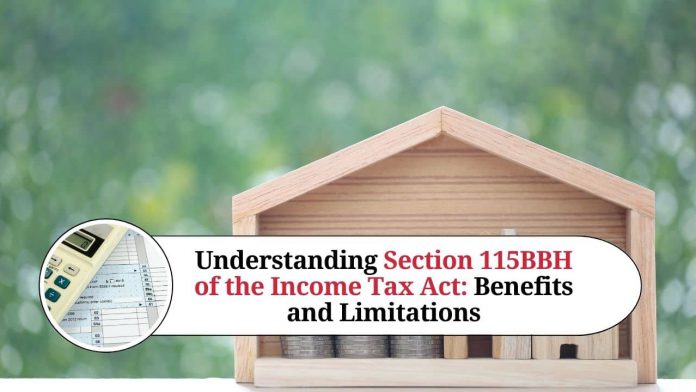Section 115BBH of the Income Tax Act, 1961, provides for a special taxation regime for income earned by non-resident Indians (NRIs) on their investments in specified investment funds. This section was introduced in the Finance Act, 2015, and has been in effect since April 1, 2016. In this blog, we will discuss the provisions of Section 115BBH in detail and understand its benefits and limitations.
What is Section 115BBH?
Section 115BBH applies to NRIs who invest in an investment fund that meets the following conditions:
- The fund should be set up and registered in India as a Category I or Category II Alternate Investment Fund (AIF) under the Securities and Exchange Board of India (SEBI) Regulations, 2012.
- The fund should have a minimum corpus of INR 100 crore, and at least 51% of the fund should be invested in infrastructure or SME sectors.
- The fund should not have been set up by splitting up or reconstruction of an existing business or by transfer of assets from an existing business.
Taxation under Section 115BBH
Under Section 115BBH, the income earned by NRIs from investments in the specified funds is taxed at a flat rate of 10%, irrespective of the tax bracket they fall under. This is a beneficial provision for NRIs as the regular tax rate on their income can go up to 30%.
However, the 10% tax rate is applicable only to income earned by NRIs from investments in the specified funds. Any other income earned by NRIs in India will be taxed as per the regular tax rates.
Benefits of Section 115BBH
- Lower tax rate: The primary benefit of Section 115BBH is the lower tax rate of 10% on income earned by NRIs from investments in the specified funds. This can result in significant tax savings for NRIs.
- Increased investment in infrastructure and SME sectors: The provision of investing at least 51% of the fund in infrastructure and SME sectors can lead to increased investment in these sectors, which can benefit the Indian economy.
- Simplified tax compliance: NRIs can benefit from simplified tax compliance as they only need to pay tax at a flat rate of 10% on their income from investments in the specified funds.
Limitations of Section 115BBH
- Limited scope: Section 115BBH applies only to NRIs who invest in the specified funds meeting the conditions mentioned above. NRIs investing in other funds or earning income from other sources will not benefit from this provision.
- Limited investment options: The specified funds that qualify for taxation under Section 115BBH are limited to Category I and Category II AIFs investing in infrastructure and SME sectors. NRIs may not find suitable investment options in these funds and may have to invest in other funds with higher tax rates.
- No tax benefits for residents: Section 115BBH applies only to NRIs and not to resident Indians. Resident Indians investing in the same funds will not benefit from the lower tax rate of 10%.
Conclusion
Section 115BBH of the Income Tax Act provides a beneficial taxation regime for NRIs investing in specified funds. It offers a lower tax rate, increased investment in infrastructure and SME sectors, and simplified tax compliance. However, it has limited scope and investment options and does not benefit resident Indians. NRIs should consider these factors while making investment decisions and consult with a tax professional to understand the implications of Section 115BBH on their tax liabilities.
Other Related Blogs: Section 144B Income Tax Act
Frequently Asked Questions (FAQs)
Q:1 What is Section 115BBH of the Income Tax Act?
A: Section 115BBH is a provision in the Income Tax Act, 1961, that provides for a special taxation regime for non-resident Indians (NRIs) who invest in specified investment funds.
Q:2 Who is eligible for taxation under Section 115BBH?
A: NRIs who invest in an investment fund that meets the conditions specified under Section 115BBH are eligible for taxation under this provision.
Q:3 What are the conditions that an investment fund must meet to qualify for taxation under Section 115BBH?
A: The investment fund must be set up and registered in India as a Category I or Category II Alternate Investment Fund (AIF) under the SEBI Regulations, 2012. The fund must have a minimum corpus of INR 100 crore, and at least 51% of the fund should be invested in infrastructure or SME sectors.
Q:4 What is the tax rate under Section 115BBH?
A: The income earned by NRIs from investments in the specified funds is taxed at a flat rate of 10% under Section 115BBH.
Q:5 Is the 10% tax rate applicable to all income earned by NRIs in India?
A: No, the 10% tax rate is applicable only to income earned by NRIs from investments in the specified funds. Any other income earned by NRIs in India will be taxed as per the regular tax rates.
Q:6 What are the benefits of Section 115BBH?
A: The benefits of Section 115BBH include a lower tax rate, increased investment in infrastructure and SME sectors, and simplified tax compliance for NRIs.
Q:7 Are there any limitations to Section 115BBH?
A: Yes, Section 115BBH has limitations such as limited scope and investment options, and it does not benefit resident Indians.
Q:8 Can resident Indians invest in the investment funds specified under Section 115BBH?
A: Yes, resident Indians can invest in the investment funds specified under Section 115BBH. However, they will not benefit from the lower tax rate of 10% as this provision applies only to NRIs.




















